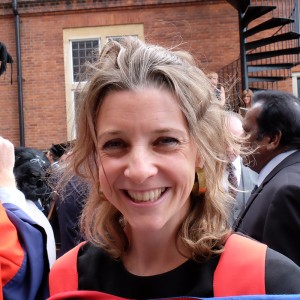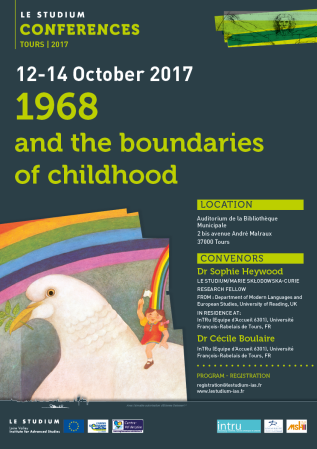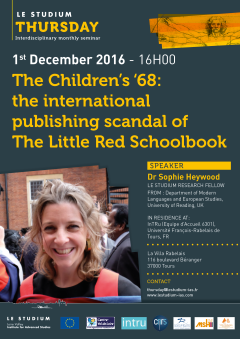Dr Sophie Heywood

Établissement d'origine
Département des langues vivantes et des études européennes, Université de Reading - UK
Laboratoire d'accueil
InTRu (Interactions, Transferts, Ruptures artistiques et culturelles), Université de Tours - FR
Hôte scientifique
Dr Cécile Boulaire
PROJET
Le '68 des enfants
(in english) The global upheaval caused by the protest movements around 1968 revolutionised social structures, overturned cultural conventions, challenged political ideologies, and catalysed civil rights activism by women, gay people and ethnic minorities. Childhood historians stress the importance of this period in altering the authority structures that shaped children’s lives. However, many of the fields driving these changes – children’s media, childhood studies, children’s heritage and art education – remain pushed to the margins within historical master narratives of 1968. These disciplines have had little chance to reflect on their own development, to draw the connections stemming from their shared heritage in 1968, or to trace the historical legacies that have shaped the assumptions underpinning them.
The overarching aim of this project is to analyse 1968 as a watershed moment in children’s culture and its related disciplines, following Marwick’s (1998) now canonical definition of 1968 as the crystallisation of the cultural revolution of the ‘long sixties’ (c.1958-c.1974). We will pursue this objective through a new research collaboration with specialists from cognate fields in childhood studies, children’s history and media, and practitioners involved in children’s culture, heritage and art education, and bring them into dialogue with historians of 1968.
By thinking about children’s culture as a site for artistic and intellectual experimentation, at the centre of ideological activity across disciplinary boundaries and national borders, this project opens up new ways of understanding the 1968 liberation movements and their legacies. With the fiftieth anniversary of 1968 approaching, it is important that the children’s perspective is finally brought to the fore of scholarly debate and public commemorations.
https://children68.hypotheses.org/
Sophie Heywood's seminar in French at InTRu, University François-Rabelais of Tous on December 13th, 2016: http://intru.hypotheses.org/4538
Publications
The Little Red Schoolbook (1969) was one of the most welltravelled media products for children from ’68 aimed at children, and it was certainly the most notorious. Over the course of a few years (1970–2) it was translated and published in Belgium, Finland, France, Great Britain, the Federal Republic of Germany, Greece, Iceland, Italy, the Netherlands, Norway, Sweden and Switzerland. It also circulated freely in Austria and Luxembourg, and reached beyond Europe to countries including Australia, Japan and Mexico. It led to an obscenity trial in Great Britain, nearly toppled the Australian government, and caused a global publishing scandal. This essay therefore looks at the Scandinavian children’s ’68 in its international context, via a transnational, comparative analysis of the reception of the LRSB, in order to examine how ‘68 counterculture and ideas of childhood clashed and converged in the West around 1970. It asks: what can the publishing history of the LRSB tell us about the distinctive features of children’s media in Scandinavia at this time?
Final reports
This project analysed 1968 as a watershed moment in children’s culture and its related disciplines, following Marwick’s (1998) now canonical definition of 1968 as the crystallisation of the cultural revolution of the ‘long sixties’ (c.1958-c.1974). We pursued this objective with specialists from cognate fields within childhood studies, including children’s history and media, children’s culture, heritage and art education, and bring them into dialogue with historians of 1968. This new collaboration brought together researchers and practitioners from Denmark, France, Germany, Italy, Sweden and the UK. By thinking about children’s culture as a site for artistic and intellectual experimentation, at the centre of ideological activity across disciplinary boundaries and national borders, this project opened up new ways of understanding the 1968 liberation movements and their legacies. Culminating in a series of public events and exhibitions in 2018 for the fiftieth anniversary of 1968, it brought the children’s perspective into scholarly debate and public commemorations.


